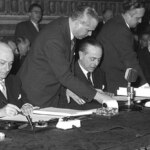José Manuel González-Páramo: "Europe is a great success but there are still blank pages to be filled in"
On March 25, 1957, representatives from the six founding countries of the European Community put their signatures to the Treaties of Rome, consisting of blank pages due to a problem with the printing. Sixty years on, Europe "is an enormous success", but today it also has "blank pages still to be filled in" for the project to continue with its process of completion. This was the metaphor used by Jose Manuel González-Páramo, the CEO of BBVA, to describe the current situation of the EU.

José Manuel González-Páramo was taking part in the session "The Future of the EU 60 Years after the Treaties of Rome", organized by the International Menéndez Pelayo University in Santander. The course was officially opened by Alfonso Dastis, Spanish Foreign Minister. In González-Páramo's opinion, after six decades the EU "is an enormous success that has surprised its greatest enthusiasts in terms of peace, economic stability, the preservation of democratic values, a free, open and competitive economy, and a belief in trade as a source of progress." He considers that Europe must now continue to make progress on economic and monetary union, as "however optimistic you can be about what we have achieved, there is still almost as much that still has to be done."
The CEO of BBVA praised the role played by the ECB in Europe's recovery from the crisis. However, he believes the institutional and legal framework of the EU must be reinforced in order to construct a more united Europe capable of dealing jointly with future challenges.
He also took stock of the European project, whose architecture has evolved a great deal. First, he highlighted the entry into force of the Maastricht Treaty in 1993 as the political culmination of a legal package binding on all the Member States.
The second major milestone he pointed to is the creation in 1999 of the Eurozone and monetary union. And third, he recalled that the financial crisis has changed the design of the institutional architecture in Europe. In 2012, the debt crisis demonstrated the existence of a vicious cycle between banks and sovereign debt. Europe reacted with a twin response: first, allowing the ECB to take on new responsibilities; and second, creating banking union.

Signatures of the heads of government of France, Luxembourg, Belgium, Holland, Italy and the Federal Republic of Germany, which ratified the 'Treaty of Rome', agreements on the European Economic Community (EEC) and Euraton (European Atomic Organization). - EFE
This brings us to today, when Europe is facing the challenge of completing the project of European Economic and Monetary Union. In the view of José Manuel González-Páramo, this is the major piece still pending in the EU puzzle.
Now that the outlook is more optimistic than a few months ago, "as citizens have looked at ourselves in the mirror and we are rethinking what we want," he said. The result is that to make progress toward genuine economic and monetary union, Europe must complete the process with some key elements.
First, it is necessary to complete banking union by establishing the deposit guarantee fund. Also necessary is completion of the Capital Market Union and progress toward Fiscal Union, which will help free the ECB from some of the functions adopted during the crisis, such as its participation in the troika. For this to take place, there must be a major leap in terms of the democracy and legitimacy of the European institutions. There is also a need for a renewed boost to convergence, jobs and economic growth, through greater coordination of economic policies, incentives for structural reforms and greater responsibility by Member States to comply with their commitments.
However, the CEO of BBVA warned that this scenario will require major political negotiations. In his opinion, it is vital for countries to find a balance between risk distribution and reduction. To this end, José Manuel González-Páramo considers a possible solution could be the creation of a "secure European asset". In any event, the model chosen will have to depend on the progress made in banking union, fiscal/economic union and the European institutional framework.

IMPU - JUAN MANUEL SERRANO
He also referred to the debate begun within the European Union about its own future. In May, the European Commission published a White Paper on the future of the Eurozone, with proposals divided into two stages (to 2019 and to 2025) on key issues. Among them is the possibility of a multi-speed Europe as a solution for continuing with the integration process. In the opinion of Jose Manuel González-Páramo, what is important is that all Member States should work together within the institutions of the European Union, despite the different degrees of integration.